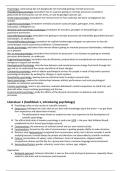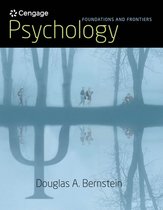Samenvatting
Samenvatting Inleiding in de Psychologie, literatuur (foundations and frontiers psychology) + hoorcolleges (eigen cijfer 8)
Dit document bevat de samenvatting van het gehele boek. Hierin is ook de samenvatting van de hoorcolleges vermeld. Deze zijn per week door te lezen. Alle begrippen zijn onderstreept zodat dit eenvoudig en snel te leren is.
[Meer zien]





